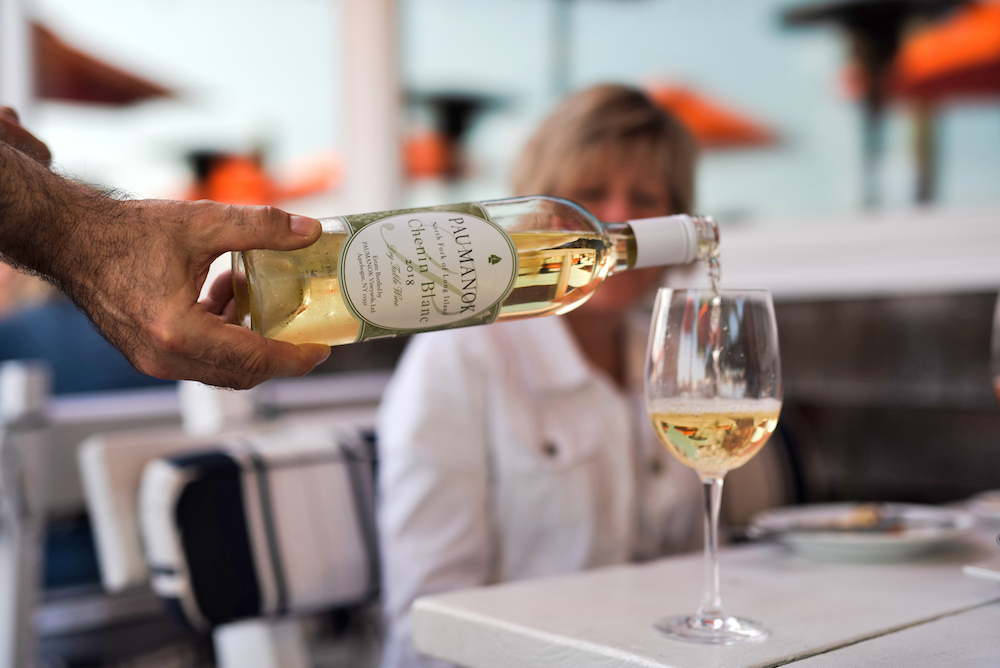So you just wrapped up a day of wine tasting on the North Fork and you’re heading to your restaurant of choice.
You think that cabernet sauvignon you enjoyed at the winery would pair nicely with the seafood you plan to order.
It would be natural to assume that in a wine region like the one here on the North Fork, your dining experience would include lots of local wine options, but that isn’t always the case. Local fare doesn’t necessarily mean local wine.
“It’s a complicated issue,” said Long Island wine pioneer Louisa Hargrave, who over the years has penned several columns about the need for more local options on North Fork restaurant wine lists.
There are several reasons why this happens, Ms. Hargrave and others explained. At its core is simple economics but beyond that there’s also a complexity in the way both restaurants and wineries operate and how their operations differ. Many eateries rely on distributors for their beverage selection, but most of the wineries on the North Fork handle their own distribution. If you’re carrying wine from 15 different Long Island operations, that could mean 15 different phone calls have to be made.
“That extra phone call is worth it,” said Carolyn Iannone, owner of Love Lane Kitchen, whose wine list holds the rare distinction of consisting entirely of wine produced by North Fork vineyards. “It’s so nice to have that local connection. At the end of day it’s the people you deal with that make your business a success. Our local winemakers care about their region. They tend to the land and grow something that is special. They are one of the most integral parts of why the North Fork is so successful.”

Much like how she looks to locally sourced ingredients to influence her ever-evolving menu of breakfast, lunch and dinner options, Iannone, a certified sommelier and former staffer at Paumanok Vineyards in Aquebogue, turns to her friends and neighbors in the wine industry to inform her wine list. She even works with local winemaker Alie Shaper of As If Wines to produce a Love Lane Kitchen branded rosé.
Iannone’s brand philosophy is simple: a local restaurant with local dishes and locally sourced beverages, so what if the margins on wine aren’t as big as they could be.
“A distributor doesn’t necessarily care about this region,” she said. “But if I run out of a certain wine, I can call over to any number of local wineries and they’ll hand deliver what I need in person.”
Hargrave, proprietor of the former Hargrave Vineyards, Long Island’s first winery, wishes everyone had that mentality, though she recognizes the situation has improved in recent years. She can recall in the early days now-retired Southold restaurateur John Ross chasing distributors out of his eponymous restaurant because he preferred to work with the locals. She also counts chefs Matt Kar, owner of the Jamesport Manor Inn, as an early adopter to this philosophy, along with Tom Schaudel of A Mano in Mattituck and A Lure in Southold.
“Even before he had restaurants here, Tom would make the trip from up island to purchase North Fork wine,” recalled Hargrave, who said the chef has never shied away from having a lower markup on local wine to make it a focus at his restaurants.
“He’s always appreciated Long Island wine,” added Russ McCall of McCall Vineyards in Cutchogue.
McCall sees this issue from a unique perspective as the owner of both a winery and cattle ranch that source area restaurants, but also having spent four decades in the distribution business as the one-time owner of Atlanta Wholesale Wine in Georgia. He knows full well that the local winery can’t beat the big distributor in terms of price, but agrees the locals have an advantage in being a name many local diners will know and appreciate — they’re not just an anonymous brand with a good price point.
At McCall, a handful of tasting room staffers double as sales associates, managing 20 or so restaurant accounts on Long Island and New York City. It’s important to be carried in a local restaurant, he said. He points to places like chef Robbie Beaver’s Frisky Oyster in Greenport or Legends in New Suffolk, where owner “Diane Harkoff is very studious with wine,” as places where he takes great pride in having his product carried. Hargrave added C.J’s in Mattituck as another places that takes great pride in its wine list and pays attention to the work of local winemakers.

Touch of Venice in Cutchogue is a restaurant everyone talks about when discussing great wine lists. Brian Pennacchia, who co-owns the Italian eatery with his father, Ettore, makes all of the decisions about the restaurant’s wine list, which boasts more than 120 options. He carries only wine from Italy or Long Island.
“Local wine goes well with local food and that’s the same pretty much anywhere they make wine,” he said. “We also work with a lot of the local wineries and they make recommendations to visit our restaurant, so there’s a partnership as well.”
Carrying those bottles of local wine is something the customer will almost always appreciate as well, Hargrave said.
“Long Island wine isn’t beverage alcohol, it’s basically artisanal wine,” she said. “If you put local wine up against wine from other regions for a blind tasting, people will very often choose Long Island wine over something far more expensive.”
That’s a big reason why Iannone, who sells every option off her all-local list by both the glass and bottle, wouldn’t have it any other way.
“When you really get to know the work and the quality that goes into the local bottles we have in our kitchen,” she said, “you know you’re giving customers the opportunity to drink something of a superior quality.”





